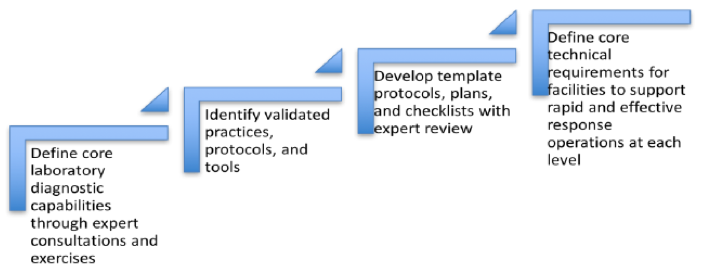Laboratory Capacity Building: Building the Evidence Base
The Elizabeth R. Griffin Program (ERGP) at the Center for Global Health Science and Security at Georgetown University is conducting collaborative research to strengthen the evidence base for laboratory capacity building. This project seeks to define the minimum core requirements at each level of a tiered national laboratory system to support effective, safe, and timely diagnostic testing and reporting during potentially catastrophic epidemic-prone or emerging disease outbreaks, and to assemble a portfolio of validated practices, protocols, and tools for laboratory capacity-building and operations.
The ERG Program will consult with a technical working group of laboratory experts, as well as with officials in six case study countries through scenario-based exercises and interviews, to define core technical requirements and identify tools. Our work will be freely available through the launch of our Laboratory Lessons Learned Portal for sharing of evidence, tools, protocols, and other guidance for laboratory capacity-building.
Laboratory systems capable of diagnosing emerging and epidemic-prone disease threats accurately, quickly, and safely are essential to preventing the spread of potentially catastrophic disease threats. The WHO Joint External Evaluation Tool (JEE) describes the desired impact of laboratory capacity-building activities as the “Effective use of a nationwide laboratory system capable of safely and accurately detecting and characterizing pathogens causing epidemic disease, including both known and novel threats, from all parts of the country.” This means that the national laboratory system must provide accurate, reliable, timely, and safe diagnostic testing to support both indicator-based surveillance and response operations during outbreaks at all levels. However, there are no global tools for evaluating the capacity of laboratory systems to function effectively at surge capacity during outbreak response.
The Elizabeth R. Griffin Program (ERGP) at the Center for Global Health Science and Security at Georgetown University is conducting collaborative research to strengthen the evidence base for laboratory capacity building. This project seeks to define the minimum core requirements at each level of a tiered national laboratory system to support effective, safe, and timely diagnostic testing and reporting during potentially catastrophic epidemic-prone or emerging disease outbreaks, and to assemble a portfolio of validated practices, protocols, and tools for laboratory capacity-building and operations.
The ERG Program will consult with a technical working group of laboratory experts, as well as with officials in six case study countries through scenario-based exercises and interviews, to define core technical requirements and identify tools. Our work will be freely available through the launch of our Laboratory Lessons Learned Portal for sharing of evidence, tools, protocols, and other guidance for laboratory capacity-building.



